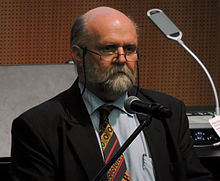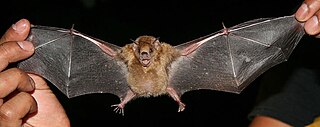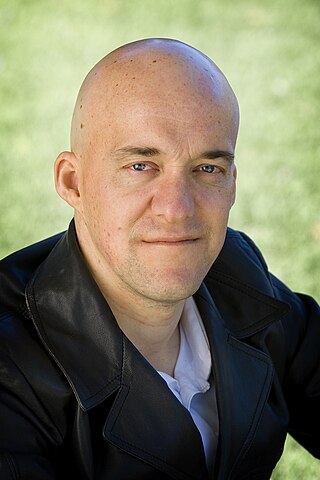Directorship


The inaugural Executive Director of the Environment Institute was economist Mike Young. He was succeeded by Professor Bob Hill in 2013. Professor Bronwyn Gillanders is the Deputy Director of the institute.
| Abbreviation | EI |
|---|---|
| Formation | 2009 |
| Headquarters | Adelaide, South Australia |
Region served | International |
Official language | English |
Executive Director | Bob Hill |
Budget | A$10 million (2009) |
Staff | 250 |
| Website | www |
The Environment Institute at the University of Adelaide brings together research groups in fields of science, engineering and economics relating to the management and use of natural resources and infrastructure. Research undertaken within the Institute aims to contribute to improvements in the management of natural resources including water, soil, land and native flora and fauna, particularly under changing climate and economic conditions. It was launched on the eve of World Environment Day, 4 June 2009. [1]
The mission of the Environment Institute is to develop practical solutions to difficult problems by bringing together the best people from science, government and the wider community. As of 2014, the Institute consists of five centres, a laboratory and two programs.


The inaugural Executive Director of the Environment Institute was economist Mike Young. He was succeeded by Professor Bob Hill in 2013. Professor Bronwyn Gillanders is the Deputy Director of the institute.
Professor Barry Brook was the inaugural Sir Hubert Wilkins Chair of Climate Change at the University of Adelaide. He co-directed the Global Ecology Laboratory with Professor Corey Bradshaw who succeeded him as Sir Hubert Wilkins Chair of Climate Change. The Environment Institute's Deputy Director, Professor Bronwyn Gillanders, is also the Director of the Marine Biology program and director of the Spencer Gulf Research & Development Initiative. Phill Cassey leads the national Australian Research Council Industry Laureate research program for ‘Combatting Wildlife and Environmental Crime’.
The Environment Institute is governed by a board. As of 2014, its membership includes:
Former board members include:
The University of Adelaide has established a number of Research Institutes including:

Tropical forests are forested landscapes in tropical regions: i.e. land areas approximately bounded by the tropic of Cancer and Capricorn, but possibly affected by other factors such as prevailing winds.
Coextinction and cothreatened refer to the phenomenon of the loss or decline of a host species resulting in the loss or endangerment of another species that depends on it, potentially leading to cascading effects across trophic levels. The term was originated by the authors Stork and Lyal (1993) and was originally used to explain the extinction of parasitic insects following the loss of their specific hosts. The term is now used to describe the loss of any interacting species, including competition with their counterpart, and specialist herbivores with their food source. Coextinction is especially common when a keystone species goes extinct.

Ecological restoration, or ecosystem restoration, is the process of assisting the recovery of an ecosystem that has been degraded, damaged, or destroyed. It is distinct from conservation in that it attempts to retroactively repair already damaged ecosystems rather than take preventative measures. Ecological restoration can reverse biodiversity loss, combat climate change, and support local economies. Habitat restoration involves the deliberate rehabilitation of a specific area to reestablish a functional ecosystem. To achieve successful habitat restoration, it's essential to understand the life cycles and interactions of species, as well as the essential elements such as food, water, nutrients, space, and shelter needed to support species populations. When it's not feasible to restore habitats to their original size or state, designated areas known as wildlife corridors can be established. These corridors connect different habitats and open spaces, facilitating the survival of species within human-dominated landscapes. For instance, marshes serve as critical stopover sites for migratory birds, wildlife overpasses enable animals to safely cross over highways, and protected riparian zones within urban settings provide necessary refuges for flora and fauna. The United Nations named 2021-2030 the Decade on Ecosystem Restoration.

The little yellow-shouldered bat is a bat species from South and Central America. It is a frugivore and an effective seed disperser.

The banana bat is an endangered species of bat in the family Phyllostomidae. It is also commonly known as the trumpet-nosed bat or the Colima long-nosed bat.
Tropical ecology is the study of the relationships between the biotic and abiotic components of the tropics, or the area of the Earth that lies between the Tropic of Cancer and the Tropic of Capricorn. The tropical climate experiences hot, humid weather and rainfall year-round. While many might associate the region solely with the rainforests, the tropics are home to a wide variety of ecosystems that boast a great wealth of biodiversity, from exotic animal species to seldom-found flora. Tropical ecology began with the work of early English naturalists and eventually saw the establishment of research stations throughout the tropics devoted to exploring and documenting these exotic landscapes. The burgeoning ecological study of the tropics has led to increased conservation education and programs devoted to the climate. Tropical ecology provides a wealth of natural resources to humans, this includes contributing to the carbon cycle, with the ability to store 50% of carbon emissions as well as turnover 40% of global oxygen. However, despite the natural services provided by tropical ecology, deforestation is a threat of tropical rainforests. Any plant of interest can be exploited for commercial reasons and extraction of these specific plant species can be at a rapid rate without time for healthy regeneration. Most of the global plant biodiversity is hosted in tropical areas, however studies in this area is mostly covered by scientist from Northern countries. Inclusion of scientist from countries where rainforest is present is heavily encouraged because it extends global knowledge and research which advances scientific contributions, benefiting tropical ecology.

Barry William Brook is an Australian scientist. He is an ARC Australian Laureate Professor and Chair of Environmental Sustainability at the University of Tasmania in the Faculty of Science, Engineering & Technology. He was formerly an ARC Future Fellow in the School of Earth and Environmental Sciences at the University of Adelaide, Australia, where he held the Sir Hubert Wilkins Chair of Climate Change from 2007 to 2014. He was also Director of Climate Science at the Environment Institute.

The Macaw Society is a long-term research project on the ecology and conservation of macaws and parrots under the direction of Donald Brightsmith and Gabriela Vigo of the Schubot Center for Avian Health at the Texas A&M University. The project has been working with wildlife and local communities since 1989. The long-term research and monitoring have provided many insights into various aspects of parrot and wildlife of south-eastern Peru. Macaws are among the most effective flagship species for ecosystem conservation in the Amazonian rainforest.

William F. Laurance, also known as Bill Laurance, is Distinguished Research Professor at James Cook University, Australia and has been elected as a Fellow of the Australian Academy of Science. He has received an Australian Laureate Fellowship from the Australian Research Council. He held the Prince Bernhard Chair for International Nature Conservation at Utrecht University, Netherlands from 2010 to 2014.
Malcolm Colin Press is a British ecologist, professor and Vice-Chancellor of Manchester Metropolitan University (MMU), in the United Kingdom.

Altitudinal migration is a short-distance animal migration from lower altitudes to higher altitudes and back. Altitudinal migrants change their elevation with the seasons making this form of animal migration seasonal. Altitudinal migration can be most commonly observed in species inhabiting temperate or tropical ecosystems. This behavior is commonly seen among avian species but can also be observed within other vertebrates and some invertebrates. It is commonly thought to happen in response to climate and food availability changes as well as increasingly due to anthropogenic influence. These migrations can occur both during reproductive and non-reproductive seasons.
Ronald Nigh is an American ecological anthropologist focusing on Caribbean areas and the Maya region in Mesoamerica. Nigh is a professor and researcher at Centro de Investigaciones y Estudios Superiores en Anthropologia Social (CIESAS), where he continues his research on ecological anthropology.
Colin A. Chapman is a professor at the Vancouver Island University in British Columbia, Canada. In addition, he is a Fellow of the Royal Society of Canada, an Honorary Lecturer at Makerere University in Uganda, a Member of the Committee of Research and Exploration at National Geographic, and an Associate Scientists of the Wildlife Conservation Society in New York. Prior to taking on his position at McGill University, he was at the University of Florida in the Department of Zoology from 1993 to 2004. He is internationally recognized for his 30+ years of research into primate ecology, population regulation, nutrition, and disease dynamics and for his contribution to conservation globally.

Lian Pin Koh is a Singaporean conservation scientist. He is the Kwan Im Thong Hood Cho Temple Professor of Conservation, Vice Dean of Research at the Faculty of Science, Director of the Centre for Nature-based Climate Solutions, and Director of the Tropical Marine Science Institute at the National University of Singapore (NUS).
The Australasian Virtual Herbarium (AVH) is an online resource that allows access to plant specimen data held by various Australian and New Zealand herbaria. It is part of the Atlas of Living Australia (ALA), and was formed by the amalgamation of Australia's Virtual Herbarium and NZ Virtual Herbarium. As of 12 August 2014, more than five million specimens of the 8 million and upwards specimens available from participating institutions have been databased.
Jennifer S. Powers is an American ecologist and full professor in the departments of ecology, evolution and behavior, and plant and microbial biology at the University of Minnesota. Powers' research has advanced the understanding of global change consequences, ecosystem ecology, restoration and conservation of tropical dry forests. She also has been very active on several editorial boards, and in 2019 became the editor-in-chief of Biotropica, a scientific journal from the Association of Tropical Biology and Conservation (ATBC).
Grizelle González is a soil ecologist working for the United States Forest Service in San Juan, Puerto Rico. She is known for her work on soil ecology, nutrient cycling, and ecosystem ecology at the Sabana Field Research Station in Puerto Rico.

Lauren B. Buckley is an evolutionary ecologist and professor of biology at the University of Washington. She researches the relationship between organismal physiological and life history features and response to global climate change.
Stacy Philpott is an American ecologist who is a professor at the University of California, Santa Cruz. Her research considers agroecology and the conservation of biodiversity. She was elected a Fellow of the Ecological Society of America in 2021.
Beth Kaplin is an American conservation scientist, professor and researcher. She is professor of conservation science in the College of Science and Technology at the University of Rwanda. She is also a research professor in the School for the Environment and a senior fellow at the Centre for Governance and Sustainability, both at the University of Massachusetts Boston.